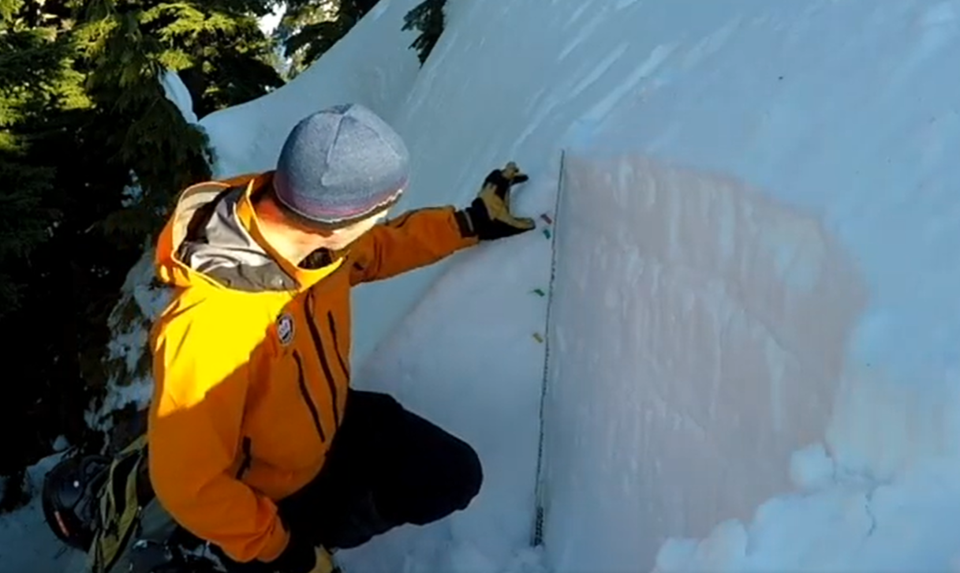North Shore Rescue has a new initiative to inform outdoor enthusiasts about local snowpack conditions and avalanche risks.
Every Friday afternoon this winter, André-Jean "AJ" Maheu, NSR’s avalanche safety officer, who has 20 years of experience under his belt and also works as Grouse Mountain’s avalanche forecaster, will be posting a conditions update video to NSR's Facebook page to inform adventurers of what to expect in the backcountry over the weekend.
In the videos, AJ discusses weather, the snowpack, avalanche problems, and more.
"AJ was super keen to share his knowledge about the snowpack with the community at large," said Mike Danks, NSR team leader.
"Our hope is people take the time to listen. Even if they don’t understand all of the things he is talking about, it gets the dialogue open, and people can then ask questions and learn about what our snowpack is doing locally on the North Shore."
On top of being aware of conditions, Danks said anyone planning on heading into the backcountry in winter needs to have avalanche safety equipment – a transceiver, probe, and a shovel – and, more importantly, needs to know how to use it.
He said he’d heard from outdoor retailers, including MEC, that equipment was selling out, but he hoped people were also taking the time to educate themselves on backcountry safety.
“What goes along with using that equipment is understanding how to navigate through avalanche terrain,” he said.
“On the North Shore, all the local mountains are surrounded by avalanche slopes that are very dangerous, so people need to understand that."
Danks said people also had to consider that NSR would not put their search and rescue volunteers at risk for someone who has gotten themselves into terrain unsafe for teams to go into.
“If the avalanche conditions are at a level where it’s not safe for SAR to respond – we’re not going to come,” he said.
“It’s that simple.”
He said there had been a couple of situations where people had been stuck in avalanche terrain in -10C conditions, and NSR has had to say, “you’re going to have to do your best to survive overnight.”
“We really want to get the message out to people, don’t put yourself in that situation. Don’t put us in that situation," said Danks.
He said often people got themselves into trouble in search of fresh powder on the North Shore ski hills.
“If the powder is skied out inbounds, that’s when they start looking outside of the boundaries of the local ski hill, and they see all this untouched beautiful snow,” he said.
“What they don’t recognize is that untouched beautiful snow is in avalanche terrain, and it is not controlled, and that’s where people can get into trouble very, very quickly as soon as they enter into slopes like that.”
For those heading into the backcountry for a winter hike, Danks said to plan ahead and make sure you have the gear to last at least a couple of hours in the cold.
“No one plans on getting injured but if that does happen, hypothermia is a huge risk in the backcountry,” he said.
“Winter is a whole different dynamic – you need to have your avalanche safety equipment, but you also need to carry much more equipment for warmth, for traction, and for survivability as well.”
If you’re going on more advanced hikes, NSR highly recommends bringing crampons, an ice axe, multiple layers of clothing, including insulated layers, a toque, and gloves, as well as the 10 essentials.
Danks encouraged people to check the NSR Facebook page on Fridays for avalanche updates and to share the post to help “get as many people educated on avalanche and snow conditions as possible.”
NSR also recommends completing an Avalanche Canada weekend course and to always check avalanche conditions before heading out into the backcountry. If you’re a beginner, the appropriate course is AST 1.
Here's last week's video to give you an idea of what to expect:
Elisia Seeber is the North Shore News’ Indigenous and civic affairs reporter. This reporting beat is made possible by the Local Journalism Initiative.



